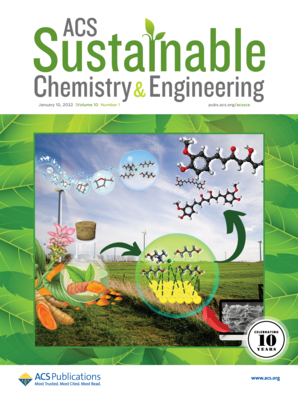High-Strength and Biodegradable Mycelial Leather Materials Cross-linked with Dialdehyde Carboxymethyl Cellulose
IF 7.3
1区 化学
Q1 CHEMISTRY, MULTIDISCIPLINARY
引用次数: 0
Abstract
In recent years, mycelium, a green and biodegradable material, has garnered strong interest from researchers for developing leather materials. Due to its high biodegradability, biocompatibility, and renewability, it is regarded as a promising alternative to animal leather. In this study, mycelia were procured via solid fermentation from Ganoderma species using readily available agricultural wastes as nutrient sources. Subsequently, mycelium-based leather (ML) was fabricated using a series of processes, including deacetylation, plasticizing, cross-linking, and hot pressing. The results showed that homemade dialdehyde carboxymethyl cellulose (DCMC) can impart the mycelium with a higher tensile strength compared to glyoxal or glutaraldehyde, approximately 772 and 276% higher, respectively. This can be attributed to its nanoscale dimensions and high reactivity, which are conducive to the penetration of DCMC into the mycelium and further cross-linking between DCMC and mycelium. The prepared DCMC heat-pressing treated ML (DCMC-HT-ML) demonstrated heat resistance up to 250 °C and showed a tensile strength of 2.18 MPa and elastic modulus of 17.24 MPa, 581 and 698% higher than the pristine ML (P-ML), respectively. Notably, the results of landfill degradation experiments indicated that DCMC-HT-ML showed no discernible difference in biodegradability compared to P-ML. This study provided a facile approach for preparing degradable ML and highlighted that mycelium is a potential alternative to next-generation green leather materials.

与二醛羧甲基纤维素交联的高强度可生物降解菌丝体皮革材料
近年来,菌丝体作为一种绿色、可生物降解的材料,在皮革材料的开发中引起了研究人员的强烈兴趣。由于其高可生物降解性、生物相容性和可再生性,被认为是一种很有前途的动物皮革替代品。在本研究中,利用可利用的农业废弃物作为营养源,通过固体发酵从灵芝物种中获得菌丝体。随后,通过脱乙酰、塑化、交联和热压等一系列工艺制备了菌丝体基皮革。结果表明,与乙二醛和戊二醛相比,自制双醛羧甲基纤维素(DCMC)可使菌丝体的抗拉强度提高约772%和276%。这可以归因于其纳米级尺寸和高反应性,这有利于DCMC渗透到菌丝体中,并进一步与菌丝体交联。制备的DCMC热压处理ML (DCMC- ht -ML)耐热温度高达250℃,抗拉强度为2.18 MPa,弹性模量为17.24 MPa,分别比原始ML (P-ML)高581和698%。值得注意的是,垃圾填埋场降解实验结果表明,DCMC-HT-ML与P-ML相比,生物降解性没有明显差异。该研究为制备可降解ML提供了一种简便的方法,并强调了菌丝体是下一代绿色皮革材料的潜在替代品。
本文章由计算机程序翻译,如有差异,请以英文原文为准。
求助全文
约1分钟内获得全文
求助全文
来源期刊

ACS Sustainable Chemistry & Engineering
CHEMISTRY, MULTIDISCIPLINARY-ENGINEERING, CHEMICAL
CiteScore
13.80
自引率
4.80%
发文量
1470
审稿时长
1.7 months
期刊介绍:
ACS Sustainable Chemistry & Engineering is a prestigious weekly peer-reviewed scientific journal published by the American Chemical Society. Dedicated to advancing the principles of green chemistry and green engineering, it covers a wide array of research topics including green chemistry, green engineering, biomass, alternative energy, and life cycle assessment.
The journal welcomes submissions in various formats, including Letters, Articles, Features, and Perspectives (Reviews), that address the challenges of sustainability in the chemical enterprise and contribute to the advancement of sustainable practices. Join us in shaping the future of sustainable chemistry and engineering.
 求助内容:
求助内容: 应助结果提醒方式:
应助结果提醒方式:


